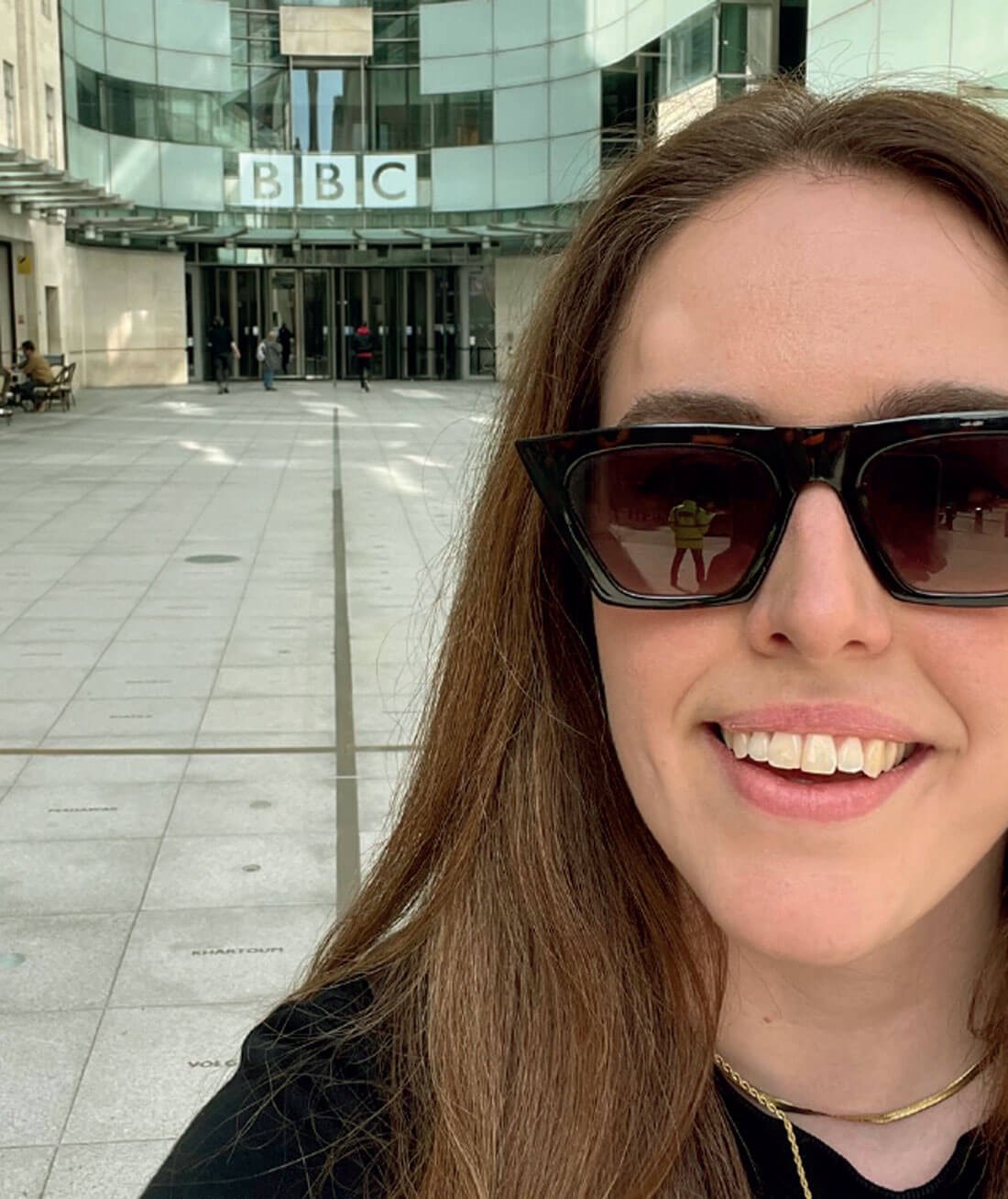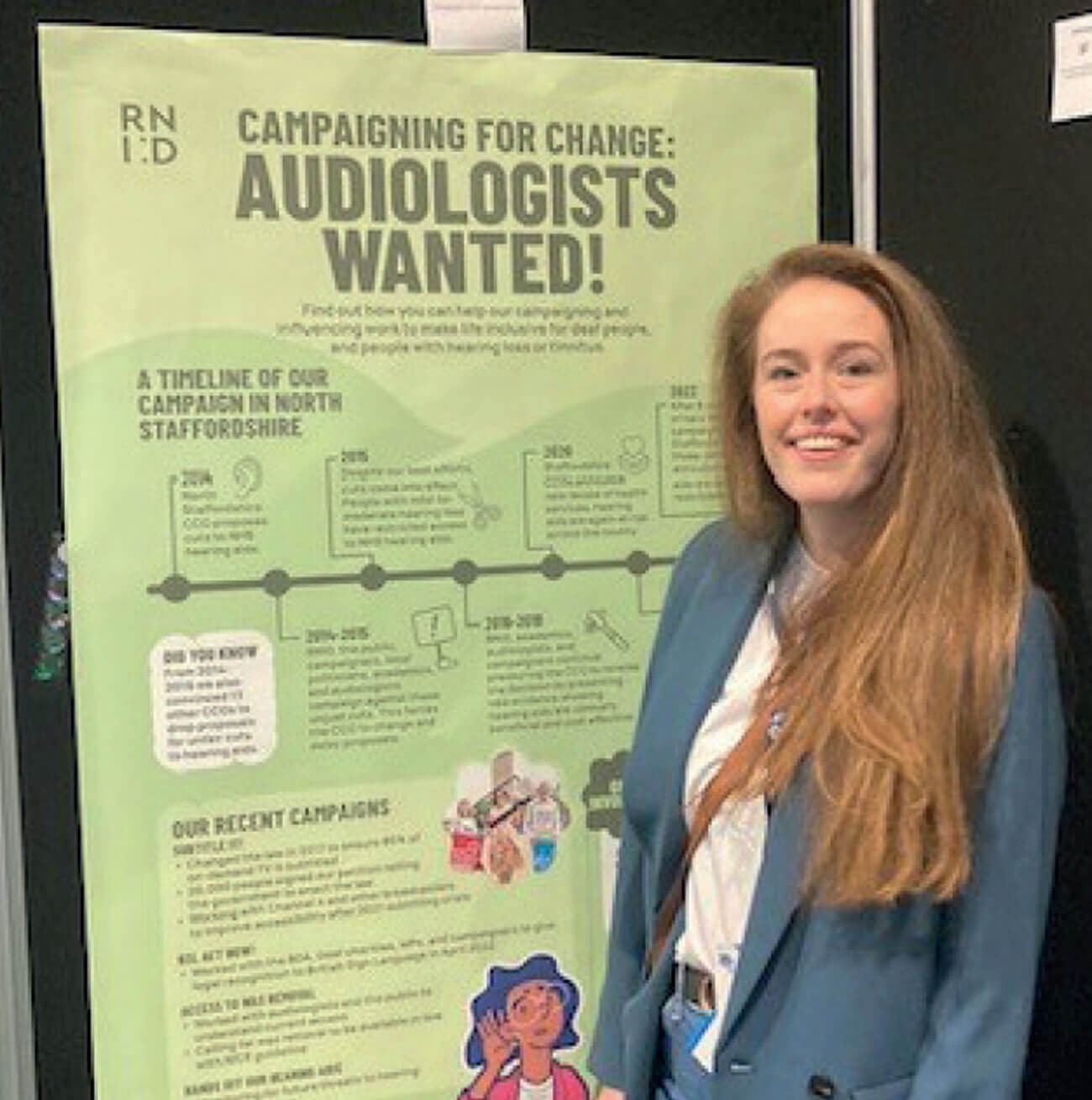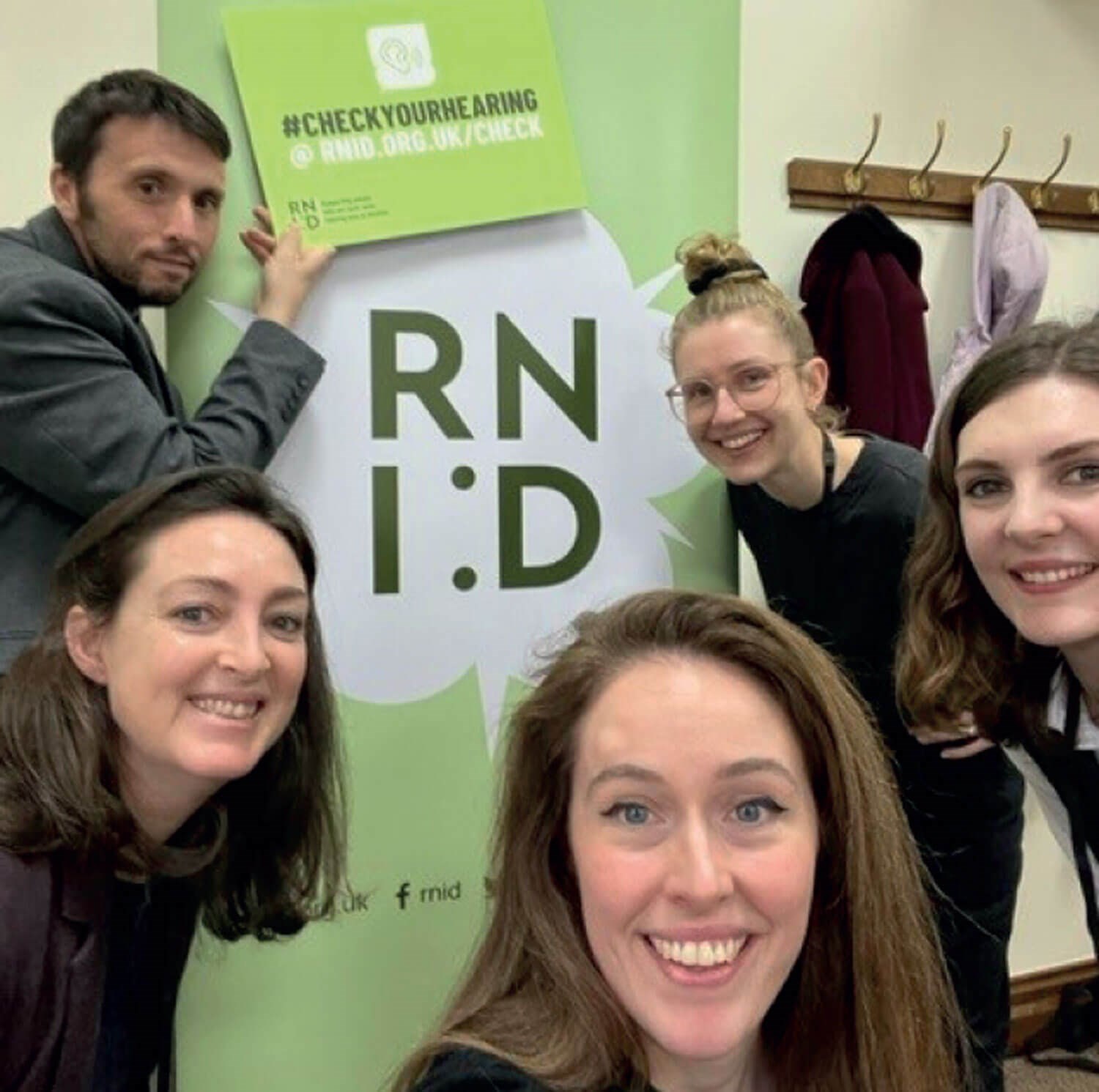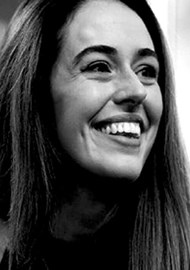In this article we hear about the Franki Oliver’s journey from clinical practice in audiology to the third sector.
Hi! I’m Franki and I’m the audiology manager at the Royal National Institute for Deaf People (RNID), a charity supporting people in the UK who are deaf, have hearing loss or tinnitus. I work within the campaigning and influencing team and lead our national audiology policy work, ensuring that everything we do puts the needs of our communities at the centre.
I’m also the in-house audiology expert and an external representative for the organisation, which means I get to go on TV sometimes! It’s a unique role and I love my job, but it wasn’t where I imagined I’d be when I started my training.
A career in audiology, and now policy, wasn’t always my plan. At 18 I applied to study biomedical science at university, with somewhat naive dreams of having an impact on the world. However, on results day I found out I hadn’t achieved the grades I needed; it was devastating. Fortunately, the university I wanted to attend offered me a space in their audiology programme. I’d never heard of audiology before but, after some thought, I said yes. It was a massive leap of faith. In hindsight, taking that risk was one of the best decisions I’ve ever made.
Despite the initial uncertainty, I loved my undergraduate degree. On placement I experienced the tangible and powerful difference good hearing care can make, and it confirmed that I could still have an impact on the world as an audiologist. Clinical placement also opened my eyes to the complexity of healthcare systems, specifically the NHS, and I became interested in the wider context of how healthcare is delivered. I decided I wanted to gain a better understanding of how big decisions relating to healthcare were made.
In my final year at university, I had the opportunity to study an optional module: I chose healthcare law, which was fascinating. Every week, we’d discuss big ethical questions such as assisted dying, how the law has been applied in practice, and the implications for public policy. While this wasn’t necessarily helpful for my practical studies, it sparked a curiosity that has stayed with me throughout my career.

I recently went to film a piece at BBC Broadcasting House
talking about the risk of noise damage.
After graduating I got a job in the NHS, gained confidence as a newly qualified professional, and built on my clinical skills. Being with patients and doing ‘bread and butter’ audiology was great, but I also seized opportunities for career development. I saw complex patients, shadowed more senior colleagues, and even went back to my university to train as a student supervisor. With time, I became responsible for the students placed in our department.
Those formative years in clinical work were so valuable, and I started thinking about how I could progress in my career. Many of my peers were applying for more specialist clinical development programmes, but I wasn’t certain this was the direction I wanted to go in. I enjoyed clinical work, but could I see myself doing it forever? I knew I wanted a new challenge, but I had no idea which direction I wanted to go in.
Figuring this out was tough, especially when working full time. The answer for me was online learning, I enrolled on loads of courses. Some weren’t particularly good, but a few were useful: the Edward Jenner programme, a clinical leadership foundation course free to NHS staff, and the Health and Care Explained course by The King’s Fund reignited my curiosity around healthcare organisation and health policy, so I started to explore it more deeply. I felt like I was going in the right direction.
During this time, I saw a role advertised at RNID (then called Action on Hearing Loss) for an audiologist to join their policy team. It seemed to be exactly what I was looking for, but how could I prove that I was the right person for the job?
Training for and performing a specialist role can sometimes fool you into thinking that it’s the only job you can do, but hearing care professionals have plenty of transferrable skills. This new role required excellent written and verbal communication, the ability to translate complex information to suit different audiences, relationship building, and strong analytical ability. These were all skills I’d learnt from my clinical role. I got the job, and was soon starting the next exciting, but daunting, chapter in my career.

Presenting my poster on our campaigning work at
the BAA Conference in Manchester in 2022.

My RNID colleagues and I went to Westminster for World Hearing Day where we talked
about the importance of regularly checking hearing with Members of Parliament.
Right from the start I was working on several key projects, such as writing new content about hearing aids for our website, responding to enquiries from members of the public, ensuring our information was accurate, and supporting our campaigning work on hearing aid restrictions, subtitles, and accessibility in healthcare settings. Being exposed to the art of successfully enacting policy change was eye-opening, and I’m still very much on the journey of learning how to influence effectively. As well as all this, I completed media training and began speaking to journalists about the importance of protecting your hearing, how to get hearing aids, and even ear wax!
It was challenging and a bit scary. I definitely experienced ‘imposter syndrome’ in those first few months, but I loved my new job. In my four years at RNID I’ve helped design and produce our flagship hearing check, supported the launch of our ear wax campaign, spoken to Members of Parliament about the importance of good hearing health, been interviewed on national television and radio, and helped reprioritise our work within the context of a global pandemic, pushing for our communities’ needs to be met throughout.
The most notable campaign I’ve worked on was our fight to end restrictions to NHS hearing aids in North Staffordshire, the only area in the UK to not provide hearing aids to people with mild or moderate hearing loss. Not only were we concerned about people in the area not being able to access hearing aids, but that similar restrictions could spread across the country. I’m very proud that I drove the latter stages of that campaign. It’s probably the hardest I’ve ever worked and was immensely frustrating at times. In total, RNID spent eight years having countless challenging conversations with commissioners, lobbying local and national government, and mobilising public support to achieve our goal. It paid off: last year it was announced that there would be no more restrictions to hearing aids in the area.
In my new role as audiology manager, I’m spending more time on our strategic thinking around hearing health. We know there’s more we need to do for our communities: we want to normalise valuing hearing and help people get help for hearing loss sooner. We also know that audiology is facing real challenges at the moment, so we want to ensure our communities can continue to access high quality services that meet their needs.
I’d really encourage aspiring audiologists to be open about your ambitions and interests. Remember that it’s ok if you want to try something new. Find a mentor who can help you work out the steps you need to take to get there. It’s also essential to challenge yourself when you can. It can be hard, but I wouldn’t be where I am now without doing things that are a bit scary. I’m excited to see where my next challenge will lead.










